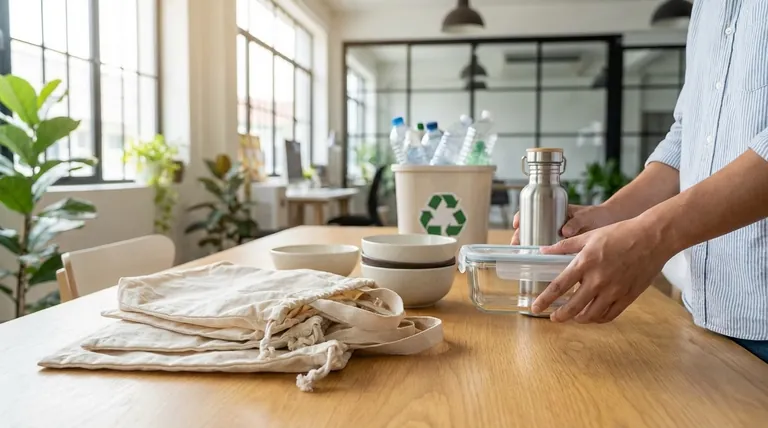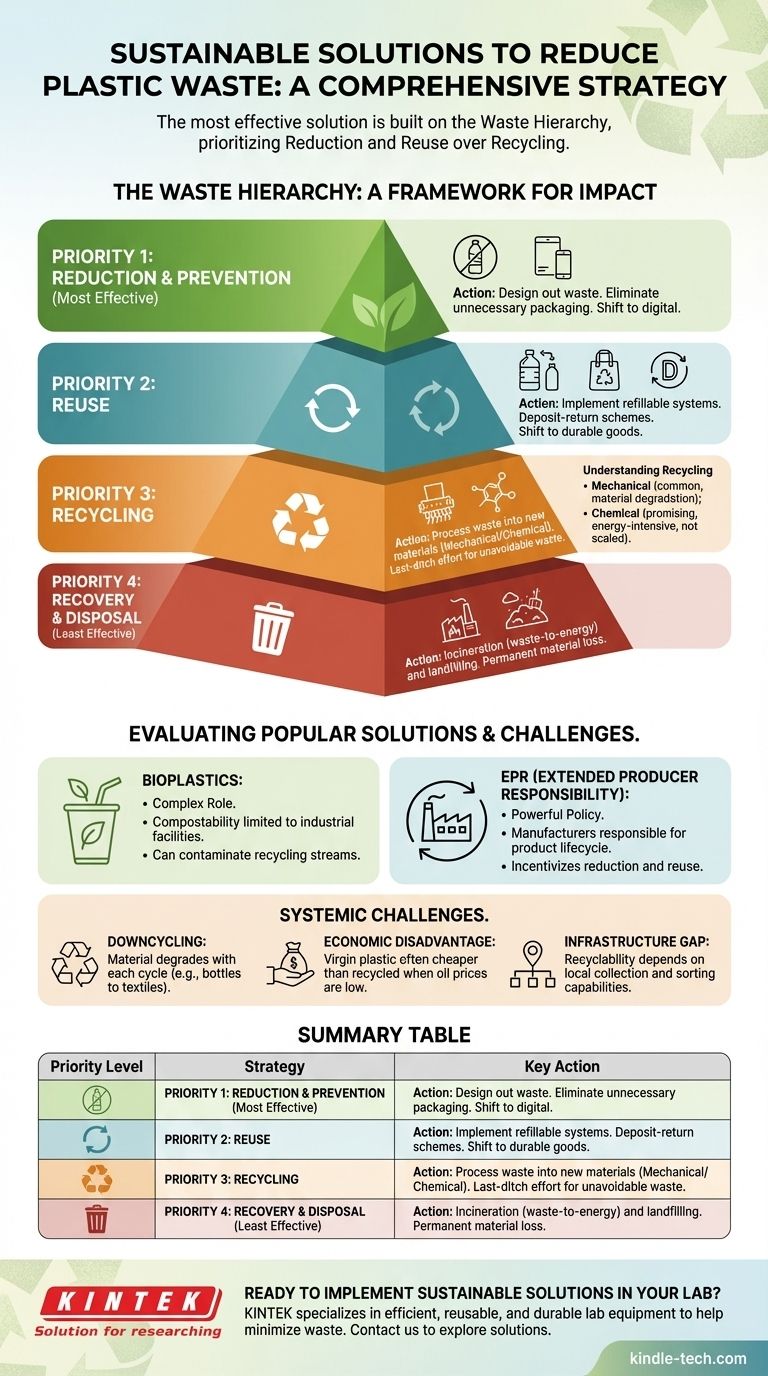単一の技術が特効薬となるわけではありませんが、プラスチック廃棄物を削減するための最も効果的で持続可能な解決策は、廃棄物ヒエラルキーに基づいた包括的な戦略です。このフレームワークは、環境への影響の順にアクションを優先し、リサイクルを検討するずっと前に、削減と再利用に最大の重点を置いています。このアプローチは、症状を管理するだけでなく、根本から問題に取り組みます。
リサイクルを主要な解決策とすることこそが決定的な間違いです。真の持続可能性は、使い捨てプラスチックの必要性を最初からなくすために、デザイン、消費、政策を根本的に再考することによって達成されます。
基本:廃棄物ヒエラルキーを理解する
廃棄物ヒエラルキーは、持続可能な廃棄物管理を導くために世界的に受け入れられているフレームワークです。これは、最も望ましいものから最も望ましくないものへと廃棄物管理オプションをランク付けし、下流の問題(リサイクルなど)から上流の解決策(予防など)へと焦点を移すことを促します。
優先順位1:削減と予防
これは最も影響力のある単一のステップです。最も持続可能なプラスチックは、決して作られないプラスチックです。
削減には、より少ない材料またはまったくプラスチックを必要としないシステムや製品を設計することが含まれます。これには、不必要な包装の排除、必須製品の「軽量化」、デジタル代替品への移行が含まれます。
優先順位2:再利用
プラスチックを排除できない場合、次に良い選択肢は、可能な限り元の形で使い続けることです。
飲料や洗浄剤用の詰め替え容器やデポジット・リターン制度などの再利用システムは、材料の価値を保持し、新しいアイテムを作成するために必要なエネルギーと資源を大幅に削減します。これは、使い捨てから耐久性のある考え方への転換を表します。
優先順位3:リサイクル
リサイクルは、スクラップまたは廃棄プラスチックを回収し、新しい製品に再加工するプロセスです。これは解決策の重要な部分ですが、それには理由があり、3番目に良い選択肢です。
埋め立て地から材料を転用する一方で、このプロセスには、エネルギー消費、材料の劣化、汚染問題など、重大な制限があります。排除または再利用できないアイテムに対する最後の手段と見なされるべきです。
最後の手段:回収と処分
この階層には、廃棄物発電焼却などのプロセス、そして最も望ましくない埋め立てが含まれます。これらのオプションは、予防、再利用、またはリサイクルできない廃棄物のために予約されており、材料資源の永久的な損失をもたらします。

この視点から一般的な「解決策」を評価する
多くの提案された解決策がメディアの注目を集めますが、それらの真の持続可能性は廃棄物ヒエラルキーを使用して評価できます。
バイオプラスチックの役割
バイオプラスチックはしばしば簡単な解決策として提示されますが、その役割は複雑です。一部は堆肥化可能に設計されていますが、それは産業施設でのみであり、裏庭のゴミ箱や開かれた環境ではそうではありません。
さらに、その生産は、土地や水の使用に関連する独自の環境フットプリントを持つ可能性があります。従来のプラスチックリサイクルストリームに入ると、汚染物質として機能し、リサイクル可能な材料のバッチ全体を台無しにする可能性があります。
拡大生産者責任(EPR)の力
EPRは、メーカーに製品の収集と最終処分を含む、製品のライフサイクル全体に責任を負わせる政策アプローチです。
これは削減と再利用のための強力な手段です。企業が包装廃棄物の経済的コストを負担するとき、彼らはより軽量で、再利用しやすく、より効率的にリサイクルできる製品を設計するよう直接的にインセンティブを与えられます。
化学リサイクルと機械リサイクル
最も一般的なタイプである機械リサイクルは、プラスチックを細断、洗浄、溶解、再成形するプロセスです。化学リサイクル(または「高度なリサイクル」)は、さまざまなプロセスを使用してプラスチックを元の分子構成要素に分解し、それから新しいバージン品質のプラスチックを作成できます。
化学リサイクルは、リサイクルが困難な混合プラスチックを処理する可能性を秘めていますが、現在は非常にエネルギー集約的であり、収率が低いことが多く、大規模で経済的に実行可能な規模ではまだ証明されていません。
トレードオフとシステム上の課題を理解する
プラスチックの循環経済を達成するには、現在のシステム内に存在する大きなハードルを認識する必要があります。
無限のリサイクル可能性という神話
ほとんどの一般的なプラスチックは無限にリサイクルできません。プラスチックを溶解して再成形するプロセスは、ポリマー鎖を劣化させます。これはダウンサイクルとして知られる現象です。
数回のサイクル後、材料はその構造的完全性を失い、より低品質の製品(例:ペットボトルが繊維や木材になる)に使用されなければならず、最終的には埋め立てられるか焼却されます。
経済的劣位
リサイクルプラスチックは、化石燃料から直接生産されるバージンプラスチックと競争しなければなりません。原油価格が低い場合、バージンプラスチックはリサイクル品よりも安価で高品質であることが多く、メーカーがリサイクルされた内容物を使用する経済的インセンティブが乏しくなります。
インフラのギャップ
製品のリサイクル可能性は、それを収集、分別、処理するための地域のインフラがなければ意味がありません。リサイクル施設の利用可能性と能力は、市町村や国によって劇的に異なり、消費者の広範な混乱と実際のリサイクル率の低さにつながっています。
目標に合った正しい選択をする
解決策に効果的に貢献するためには、あなたの行動が廃棄物ヒエラルキーに合致している必要があります。
- 製品デザイナーまたはビジネスリーダーである場合:あなたの主な焦点は、プラスチックフリーの材料を検討し、堅牢な再利用および詰め替えシステムに投資することで、最初から廃棄物を設計から排除することであるべきです。
- 政策立案者である場合:拡大生産者責任(EPR)のような法案を優先し、廃棄物削減のための上流インセンティブを生み出す再利用インフラに資金を提供してください。
- 個人消費者である場合:あなたの最大の力は、使い捨てアイテムの消費を削減し、積極的に再利用可能な代替品を選択することにあります。リサイクルは最後の選択肢であり、最初の選択肢ではありません。
プラスチックの持続可能な未来は、廃棄物をより良く管理することによってではなく、そもそも廃棄物を生み出さない経済的および社会的システムを構築することによって達成されます。
要約表:
| 優先レベル | 戦略 | 主な行動 |
|---|---|---|
| 1(最も効果的) | 削減&予防 | 廃棄物を設計から排除、不必要な包装をなくす |
| 2 | 再利用 | 詰め替えシステム、デポジット・リターン制度を導入 |
| 3 | リサイクル | 廃棄物を新しい材料に加工(機械的/化学的) |
| 4(最も効果が低い) | 回収&処分 | 焼却、最終手段としての埋め立て |
研究室で持続可能なソリューションを導入する準備はできていますか? KINTEKは、効率的で再利用可能、耐久性のある製品を通じて、研究室の廃棄物を最小限に抑えるのに役立つ研究室機器と消耗品を専門としています。お客様の持続可能性目標をサポートします。当社のソリューションが、高い性能を維持しながら環境への影響をどのように削減できるかを探るために、今すぐ専門家にお問い合わせください。
ビジュアルガイド

関連製品
- リチウム電池包装用アルミニウム・プラスチック複合フィルム
- 実験用ITO FTO導電ガラス洗浄花かご用カスタム機械加工・成形PTFEテフロン部品メーカー
- 電気ロータリーキルン小型ロータリー炉バイオマス熱分解プラント
- クリーニングラック用カスタムPTFEテフロン部品メーカー
- 壁掛け式蒸留水器
よくある質問
- ロータリーエバポレーターは何をするものですか?実験室での穏やかで効率的な溶媒除去を実現
- 超低温フリーザーは何に使用されますか?貴重な生体サンプルを何十年も保存する
- 焼却に比べて熱分解の利点は何ですか?資源回収でよりクリーンな廃棄物変換を実現
- 制御された加熱反応システムは、どのようにして白金ナノ粒子の形態制御を実現するのでしょうか?
- 温度制御はグリーンナノ粒子合成にどのように影響しますか?ハイテク撹拌機で精度を実現
- 融解と焼結の違いは何ですか?材料接合方法をマスターする
- ダイヤモンドはグラファイトよりも優れた熱伝導体ですか?熱伝導率の原子レベルの秘密を解き明かす
- 大量のナノ粒子を合成するために、どの方法を好みますか?産業生産へのスケールアップ







